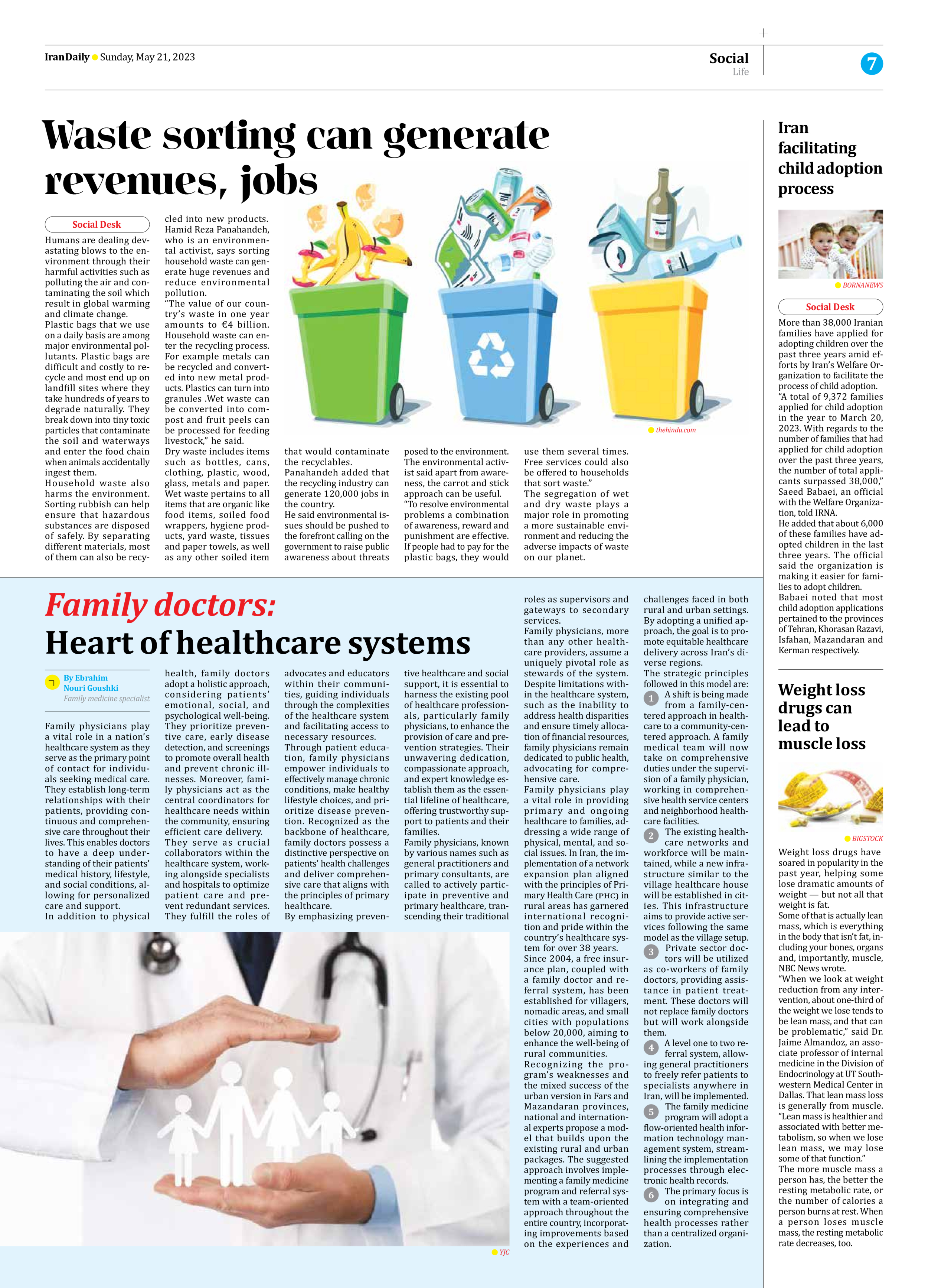
Family doctors: Heart of healthcare systems
By Ebrahim Nouri Goushki
Family medicine specialist
Family physicians play a vital role in a nation’s healthcare system as they serve as the primary point of contact for individuals seeking medical care. They establish long-term relationships with their patients, providing continuous and comprehensive care throughout their lives. This enables doctors to have a deep understanding of their patients’ medical history, lifestyle, and social conditions, allowing for personalized care and support.
In addition to physical health, family doctors adopt a holistic approach, considering patients’ emotional, social, and psychological well-being. They prioritize preventive care, early disease detection, and screenings to promote overall health and prevent chronic illnesses. Moreover, family physicians act as the central coordinators for healthcare needs within the community, ensuring efficient care delivery.
They serve as crucial collaborators within the healthcare system, working alongside specialists and hospitals to optimize patient care and prevent redundant services. They fulfill the roles of advocates and educators within their communities, guiding individuals through the complexities of the healthcare system and facilitating access to necessary resources.
Through patient education, family physicians empower individuals to effectively manage chronic conditions, make healthy lifestyle choices, and prioritize disease prevention. Recognized as the backbone of healthcare, family doctors possess a distinctive perspective on patients’ health challenges and deliver comprehensive care that aligns with the principles of primary healthcare.
By emphasizing preventive healthcare and social support, it is essential to harness the existing pool of healthcare professionals, particularly family physicians, to enhance the provision of care and prevention strategies. Their unwavering dedication, compassionate approach, and expert knowledge establish them as the essential lifeline of healthcare, offering trustworthy support to patients and their families.
Family physicians, known by various names such as general practitioners and primary consultants, are called to actively participate in preventive and primary healthcare, transcending their traditional roles as supervisors and gateways to secondary services.
Family physicians, more than any other healthcare providers, assume a uniquely pivotal role as stewards of the system. Despite limitations within the healthcare system, such as the inability to address health disparities and ensure timely allocation of financial resources, family physicians remain dedicated to public health, advocating for comprehensive care.
Family physicians play a vital role in providing primary and ongoing healthcare to families, addressing a wide range of physical, mental, and social issues. In Iran, the implementation of a network expansion plan aligned with the principles of Primary Health Care (PHC) in rural areas has garnered international recognition and pride within the country’s healthcare system for over 38 years.
Since 2004, a free insurance plan, coupled with a family doctor and referral system, has been established for villagers, nomadic areas, and small cities with populations below 20,000, aiming to enhance the well-being of rural communities.
Recognizing the program’s weaknesses and the mixed success of the urban version in Fars and Mazandaran provinces, national and international experts propose a model that builds upon the existing rural and urban packages. The suggested approach involves implementing a family medicine program and referral system with a team-oriented approach throughout the entire country, incorporating improvements based on the experiences and challenges faced in both rural and urban settings. By adopting a unified approach, the goal is to promote equitable healthcare delivery across Iran’s diverse regions.
The strategic principles followed in this model are:
A shift is being made from a family-centered approach in healthcare to a community-centered approach. A family medical team will now take on comprehensive duties under the supervision of a family physician, working in comprehensive health service centers and neighborhood healthcare facilities.
The existing healthcare networks and workforce will be maintained, while a new infrastructure similar to the village healthcare house will be established in cities. This infrastructure aims to provide active services following the same model as the village setup.
Private sector doctors will be utilized as co-workers of family doctors, providing assistance in patient treatment. These doctors will not replace family doctors but will work alongside them.
A level one to two referral system, allowing general practitioners to freely refer patients to specialists anywhere in Iran, will be implemented.
The family medicine program will adopt a flow-oriented health information technology management system, streamlining the implementation processes through electronic health records.
The primary focus is on integrating and ensuring comprehensive health processes rather than a centralized organization.







